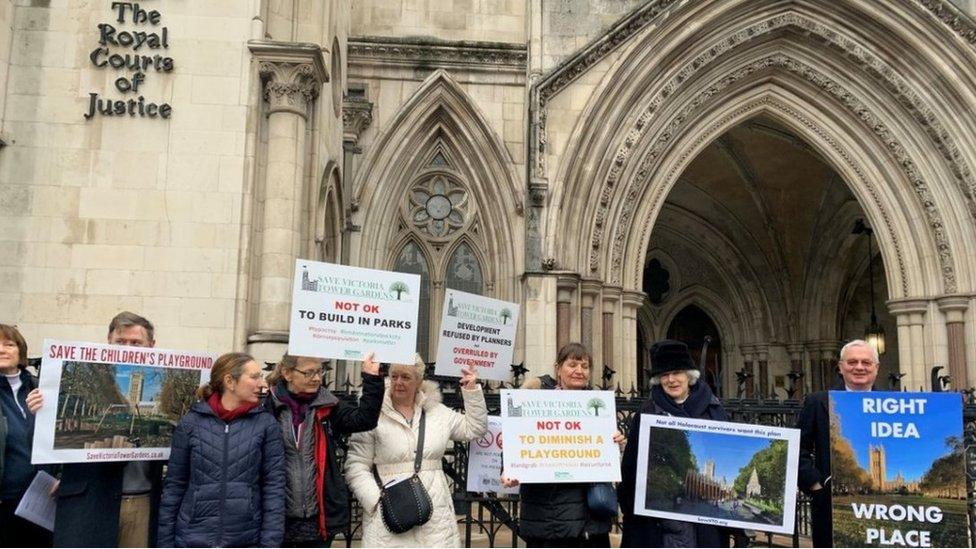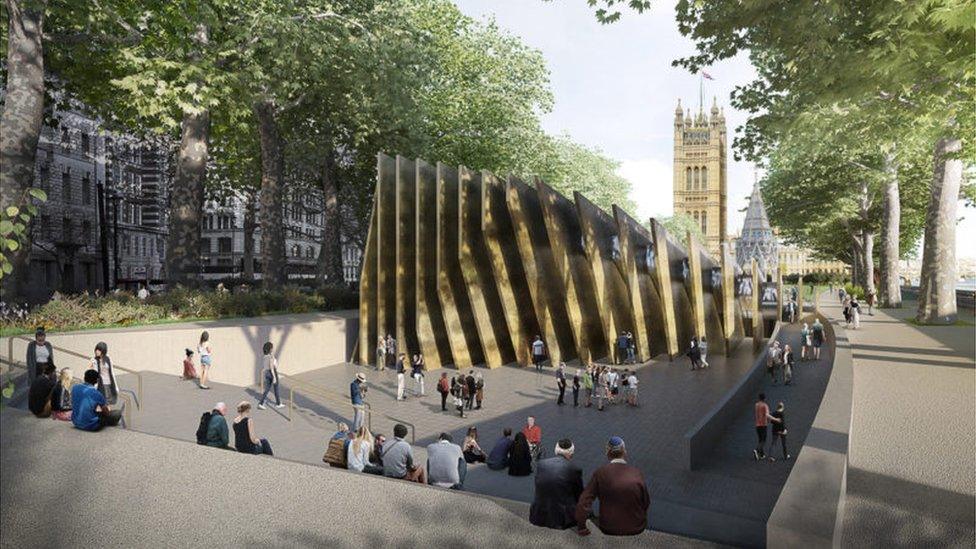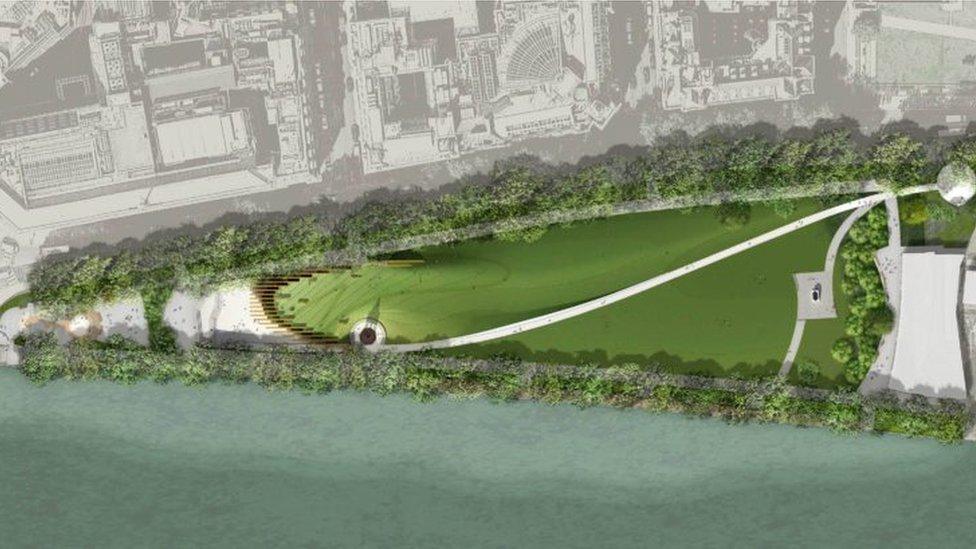Holocaust memorial: Planning permission for Parliament monument quashed
- Published

Protesters outside the Royal Courts of Justice
Planning permission for a national Holocaust memorial outside Parliament has been quashed by the High Court.
Campaigners successfully challenged the government after it overturned a decision by Westminster Council to refuse permission for the monument.
The London Historic Parks and Gardens Trust said the government has a chance to "reflect and reconsider the best site for a fitting Holocaust Memorial".
The government has said it remains committed to a permanent memorial.
Leaders from UK's Jewish community have expressed disappointment at the ruling, arguing the memorial was needed to continue to educate people about the Holocaust and the age of Holocaust survivors meant time was short to build one.
The London Historic Parks and Gardens Trust, which launched the case, had argued it was the "right idea, wrong place".
The charity opposed the UK Holocaust Memorial and Learning Centre being built in Victoria Tower Gardens, a small triangular Grade II-listed green space next to Westminster Abbey and the Palace of Westminster.
Westminster City Council had refused to give planning permission in November 2019 but it was granted in July last year, following a public inquiry and the recommendations of a planning inspector.

The plans for the now-quashed memorial in Victoria Tower Gardens
The memorial, which was due to open in 2024, aimed to be a place for national remembrance of the six million Jewish people murdered in the Holocaust, as well as the millions of other victims of Nazi persecution.
It was set to include 23 bronze fins and an underground learning centre.
Former Prime Minister David Cameron announced plans for the memorial in 2016 but disagreements over its meaning, public safety and potential harm to parkland have followed the project.
'Enable further consideration'
A number of other high-profile organisations and individuals also objected to the planned site, including former Archbishop of Canterbury Rowan Williams.
The trust's lawyer, Richard Drabble QC, argued it did not comply with a 1900 legal act affecting park land, which contains "a prohibition on using Victoria Tower Gardens as anything other than a garden open to the public".
In a ruling issued on Friday, Mrs Justice Thornton said the case against the planning permission decision succeeded in relation to a 1900 act.
The judge said the act "imposes an enduring obligation" to retain land "as a public garden and integral part of the existing Victoria Tower Gardens".
"Accordingly, the appropriate remedy is to quash the decision, so as to enable further consideration of the implications of the London County Council (Improvements) Act 1900 for the proposed scheme," she concluded.
Mrs Justice Thornton also refused the government permission to appeal against her judgment.
However, the government has 21 days to apply for permission to appeal from the Court of Appeal.

The proposal featured 23 large bronze fin structures and an underground learning centre
Helen Monger, director of the London Historic Parks and Gardens Trust, described the ruling as a "major boost for the protection of London parks at a time when they've never been more valued by the public".
"The High Court has given the government a welcome chance to reflect and reconsider the best site for a fitting Holocaust Memorial which the UK deserves, without tearing up historic protections for our parks," she added.
Karen Pollock, chief executive of the Holocaust Educational Trust, described the ruling as "disappointing news", adding that Holocaust survivors are "elderly and their numbers are dwindling - time is of the essence".
She said: "Many hope to see the opening of the Holocaust Memorial and Learning Centre standing proudly next to Parliament, serving as a warning from history of what can happen when antisemitism and hate is left unchecked. This memorial will stand as a reminder for generations to come."
The UK's chief rabbi Ephraim Mirvis said the ruling was an "unfortunate setback" for the country's "commitment to teaching the essential lessons of the Holocaust".
He said: "With hateful rhetoric on the rise across the world our sacred responsibility to live up to that commitment is more urgent and vital than ever."
The chief rabbi added the possible educational impact of having a memorial "next to the seat of our country's democracy" significantly outweighs any planning objections.
The Department for Levelling Up, Housing and Communities, which applied for the planning permission originally, said it will "study the judgement carefully and consider our next steps".
A spokesperson said: "The government remains committed to the creation of a new national memorial commemorating the victims of the Holocaust, and it is disappointing - especially for Holocaust survivors - that this judgement will delay its completion."
The decision to overturn was taken by the then-housing minister Chris Pincher, following the recommendations of a public inquiry - a move which was then challenged in the courts.
Responsibility had been delegated to Mr Pincher by former Communities Secretary Robert Jenrick, who originally applied for the planning permission.
A spokesperson for current Housing minister Stuart Andrew said: "We note today's judgement and will consider it carefully before deciding on next steps. It would not be appropriate to comment further at this stage."
Campaigners said the planned site risked affecting the park "irrevocably" as well as raising concerns over the alleged impact on trees, potential flooding, and other monuments.
At a hearing in February, the London Historic Parks and Gardens Trust argued there was an "unlawful" approach taken to considering other sites for the memorial.
Lawyers representing the government argued that there was "no error of law" in the decision-making process and policy was not "misinterpreted or misapplied".
Related topics
- Published22 February 2022

- Published29 July 2021
